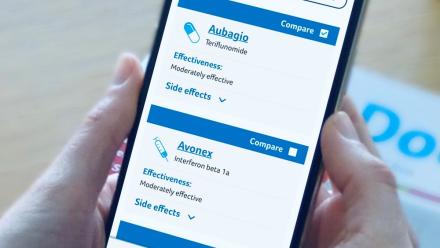Disease modifying drugs (DMDs)
DMDs are a group of treatments for people with relapsing MS which reduce the number and severity of any relapses you might experience.
There is a wide range of disease modifying drugs (DMDs) approved for use by the NHS for people with relapsing remitting MS (RRMS). Each drug offers a different combination of benefits and risks. Our MS Decisions tool can help you understand your options and make an informed choice.
You might be coming to MS Decisions because:
Whatever your situation, MS Decisions can help you by providing reliable information about DMDs for RRMS in a format that makes it easy to compare your options.


Use the MS Decisions tool to compare up to three drugs side-by-side.
Find out who can take each drug, the possible side effects and monitoring that might be needed.
MS Decisions was highly commended in the 2016 BMA Patient Information Awards.
An excellent resource that will help many people through a difficult decision.